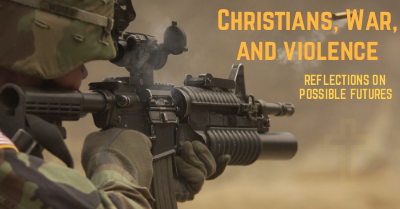|
My blog posts revolve around my interests and vocation as a historian: the intersection of history and contemporary church life, the intersection of history and contemporary politics, serendipitous discoveries in archives or on research trips, publications and research projects, upcoming conferences, and speaking engagements.
I sometimes blog for two other organizations, the Canadian Baptist Historical Society and the Centre for Post-Christendom Studies. The views expressed in these blogs represent the views of the authors, and not necessarily those of any organizations with which they are associated. |
|
“Fake news” has been around since the first hieroglyphic drawn on a Pharaoh’s tomb, the first panegyric in an imperial court, or the first stone relief carved on a Roman victory column. Rulers have almost always lied about their intentions and actions, and no more so than when at war. As Winston Churchill stated: “In wartime, truth is so precious that she should always be attended by a bodyguard of lies.” Or, as Hiram Johnson quipped, “The first casualty, when war comes, is truth.” Increasingly throughout the nineteenth century newspapers became a forum for the expression and formation of public opinion.[1] John A. Hobson, one of the most prominent late-Victorian opponents of imperialism, was concerned about the power of the press in promoting imperialism.[2] John Bourinot claimed that the influence of the press played a key role in educating the “masses” about the key issues of the day.[3] But what about when the newspapers were lying, especially in times of war?
Consider the events surrounding the Soviet Union’s invasion of Finland in late 1939.[4] In the weeks leading up to the invasion, Moscow Radio, Pravda, and other Soviet “news” organs vigorously decried the Finnish threat, hoping to assuage foreign government concerns over an avowedly anti-imperial government planning a blatantly imperial action against its relatively tiny neighbor, as well as grooming the Russian public for a sought-after war. The staged border incident with Finland on November 26 (Stalin had learned from Hitler’s pretext against Poland on this point) provided an opportunity for manufactured outrage, and Finnish “treachery” was trumpeted in the Soviet press and in government proclamations as a just cause for war. The Russian invasion that followed a few days later was cast as a just defence of the homeland against a perfidious, unfaithful, intransigent, and bellicose neighbor. There was simply no way for the Russian citizens to know the truth of what led to war. History is filled with false pretexts for war; and read up on the Gulf of Tonkin Incident if you think covert war-promoting “fake news” can only be found in Soviet Russia and not in the West.[5] We are not necessarily better off today, for access to ubiquitous social media does not guarantee access to the truth. In fact, politicians of all parties – both on the Right and Left – still lie, military leaders misdirect, political hacks defend no matter the issue, religious leaders invoke God, and trolls provoke readers. And now computer algorithms determine what is found in online searches, determining in advance what is “true.” At the end of the day, getting to the truth of something as complicated as military conflict is difficult at the best of times. And even democracies have a track record of fabricating false pretexts for war. All in all, as George Orwell put it, “Political language – and with variations this is true of all political parties, from Conservatives to Anarchists – is designed to make lies sound truthful and murder respectable, and to give an appearance of solidarity to pure wind.”[6] Governments can also intentionally hide or obfuscate military policy so as to avoid provoking a reaction from churches, such as in Britain during the firebombing of Nazi Germany.[7] Christians need to heed the words of Andrew Fuller, a prominent British Baptist theologian writing during the Napoleonic Wars. He was well aware of the prejudices of government propaganda and the biases of newspapers, and was critical of those whose political loyalties kept them from seeking the truth in the midst of the wartime political noise: “If we choose to be deceived, deceived we shall be and ought to be.” He urged his followers to read widely, seek truth, and look for “evidence” in order to avoid becoming “the dupe” of political parties actively engaged in disinformation.[8] Stated simply for our day, when the war drums start beating assume bias in every politician and party, every newscast and in every social media platform. If you think that only your opponent’s media is biased, or you can only see the political shenanigans of your opponents, then (1) you are naive, or (2) you have descended to the level of a partisan hack. In either case, your Christian discernment of events will be highly suspect. So what is the way forward? More on “Fake News” in the next post… (This is blog post #2 in the series entitled "Christians, War, and Violence: Reflections on Possible Futures".) Click here for Fake News: Media and War (Part 2). Click here for Fake News: Media and War (Part 3). [1] Stefanie Markovits, “Rushing into Print: ‘Participatory Journalism’ during the Crimean War,” Victorian Studies 50, 4 (Summer 2008): 559–86. [2] John A. Hobson, Imperialism: A Study (London, 1902). [3] John George Bourinot, The Intellectual Development of the Canadian People: An Historical Review (Toronto: Hunter, Rose & Company, 1881), 83. [4] Robert Edwards, White Death: Russia’s War on Finland, 1939–1940 (London: Phoenix, 2007). [5] https://en.wikipedia.org/wiki/Gulf_of_Tonkin_incident [6] George Orwell, Why I Write (New York: Penguin, 2005), 120. [7] Randall Hansen, Fire and Fury: The Allied Bombing Campaign of German, 1942–1945 (Toronto: Anchor Canada, 2009), ch. 18. [8] Andrew Fuller, Thoughts on Civil Polity on Attachment to Government (1808).
0 Comments
Leave a Reply. |
Archives
May 2024
|

 RSS Feed
RSS Feed
